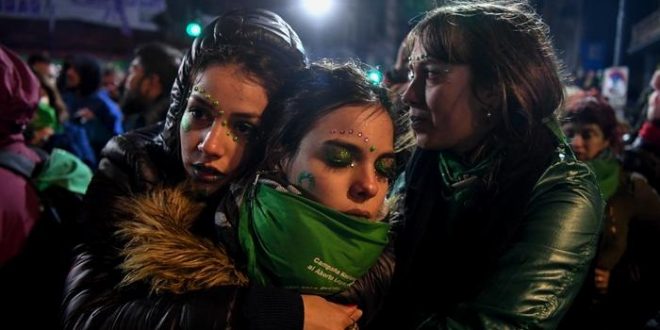30-12-2020
 BUENOS AIRES: Argentina’s Senate voted early Wednesday to legalize elective abortion, marking a historic shift in the heavily Catholic country that is the homeland of Pope Francis.
BUENOS AIRES: Argentina’s Senate voted early Wednesday to legalize elective abortion, marking a historic shift in the heavily Catholic country that is the homeland of Pope Francis.
Following a debate that went well past midnight, the Senate passed the bill 38 to 29 with one abstention just over two weeks after the Chamber of Deputies, the lower house of Argentina’s Congress, narrowly approved the measure.
The decision comes after years of organizing within the Argentine abortion-rights movement.
 “The emotion invades us, the work was a lot and the road to get here was long, but we got there,” Elizabeth Gómez Alcorta, minister of women, genders and diversity wrote Monday evening before the vote. “We have the opportunity to make history.”
“The emotion invades us, the work was a lot and the road to get here was long, but we got there,” Elizabeth Gómez Alcorta, minister of women, genders and diversity wrote Monday evening before the vote. “We have the opportunity to make history.”
The Voluntary Interruption of Pregnancy Bill permits an abortion to take place throughout the initial 14 weeks of pregnancy. Currently, abortion is only legal in Argentina if the mother’s life is jeopardized or if the pregnancy is a result of rape. Women who fall outside these provisions and get an abortion can face criminal charges.
Argentine President Alberto Fernández initially proposed the legislation in  mid-November. Fernández, who was elected in late 2019, has been vocal about legalizing abortion during his presidency and says he will sign the measure.
mid-November. Fernández, who was elected in late 2019, has been vocal about legalizing abortion during his presidency and says he will sign the measure.
The results of Argentina’s vote are significant given the country’s overwhelmingly Roman Catholic population. Pope Francis, who was born in Buenos Aires, has previously voiced his opposition to the legislation, equating abortion to hiring “a hitman.”
Argentina joins a small group of Latin American and Caribbean countries that have legalized elective abortion, including Uruguay, Cuba and Guyana. A  significant majority of countries in the region restrict access unless the mother’s life is threatened, and some countries outlaw it altogether.
significant majority of countries in the region restrict access unless the mother’s life is threatened, and some countries outlaw it altogether.
Argentina has come close to legalizing abortion in the past. In 2018, the legislation failed in the Senate by just seven votes, the country was then led by President Mauricio Macri who did not actively support the measure.
In 2018 and 2020, people backing the legalization have sported green clothing and often held or worn green bandannas, a visual that has become linked with the movement.
 Supporters have continued to wear green leading up to the Senate and lower house votes. Those who oppose the legislation have protested while wearing blue.
Supporters have continued to wear green leading up to the Senate and lower house votes. Those who oppose the legislation have protested while wearing blue.
Before Wednesday’s decision, the vote was forecast to be nearly even, with just a handful of senators remaining undecided, according to the Argentine newspaper Claein.
Argentina is not the only country in Latin America with changing politics surrounding increased access to abortion. Colombia, Chile and Mexico have seen growing movements, as reported by Reuters. Notably in March,  Colombia’s Constitutional Court debated legalizing abortion but ended up not issuing a decision.
Colombia’s Constitutional Court debated legalizing abortion but ended up not issuing a decision.
Despite being largely illegal throughout the region, approximately 5.4 million abortions occurred annually in Latin America and the Caribbean between 2015 and 2019, the Guttmacher Institute reports.
Argentina’s Ministry of Health has said that in 2018, 35 women died from medical issues arising from having an abortion. Two years earlier, according to Human Rights Watch, the agency also reported that over 39,000 women and girls were hospitalized due to problems from abortions and miscarriages. Of that total, 5,816 were 15 to 19 years old and 348 were 10 to 14 years old. (Int’l Monitoring Desk)
 Pressmediaofindia
Pressmediaofindia




